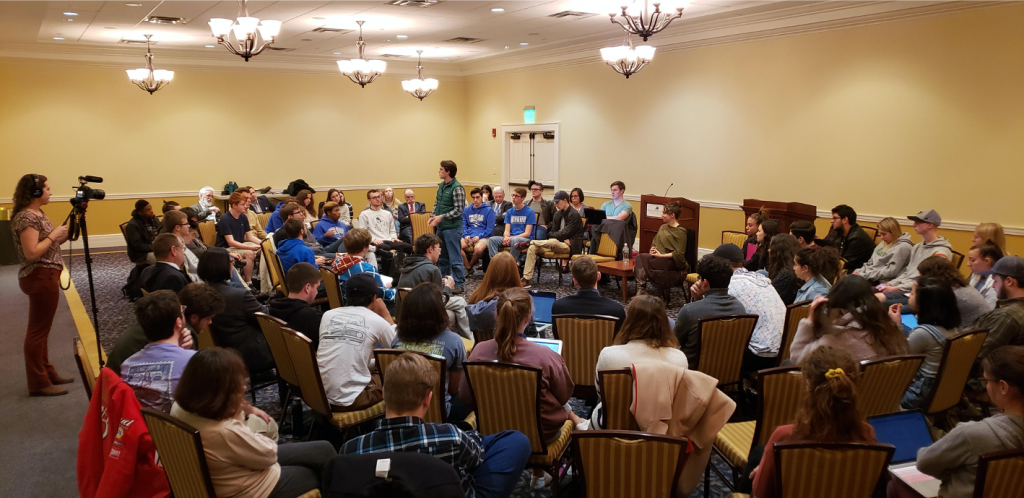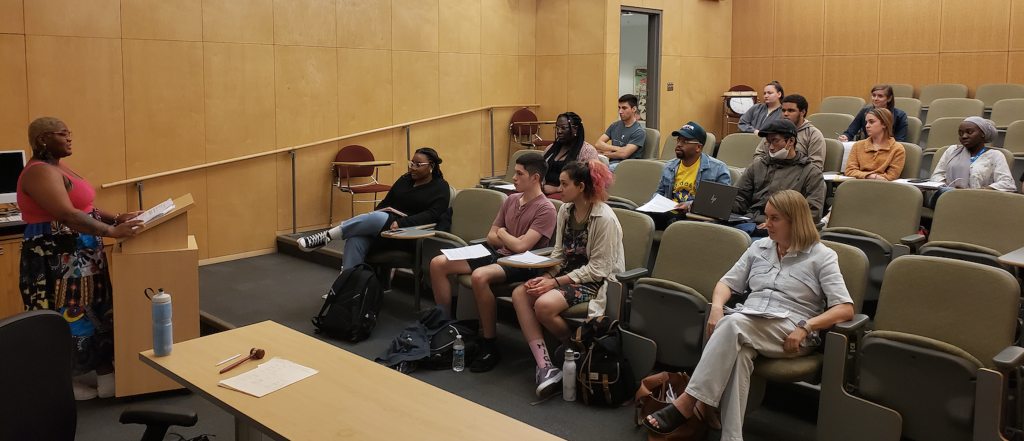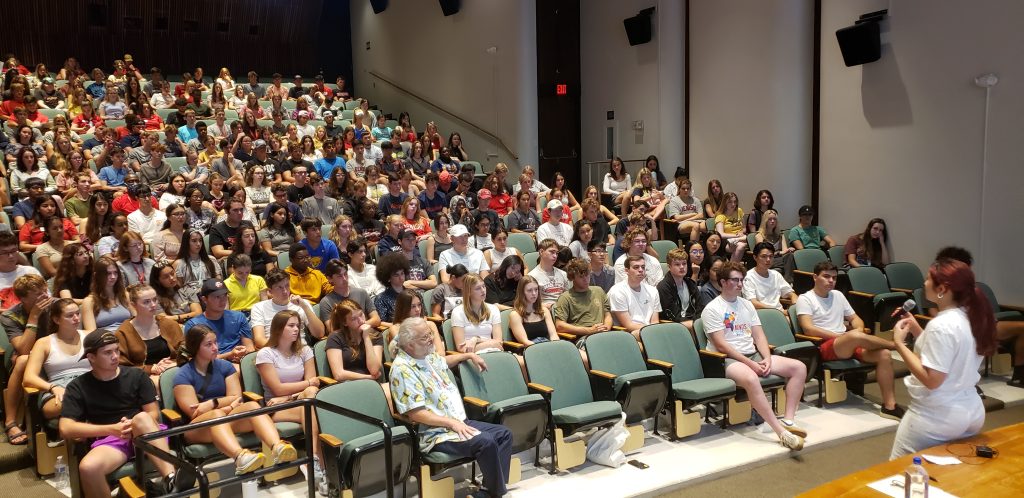What is a Braver Angels debate?
Braver Angels Debates are non-competitive and highly immersive and experiential for students. They are not performative or spectator-oriented — very different in tone and approach from televised debates that politicians engage in. Everyone in the room is invited to participate – whether they are college students, faculty, staff, or college presidents (we’ve had all of the above). They are moderated by expertly trained debate Chairs in a light parliamentary style that guides conversation and encourages deep listening and respect.
As of the start of academic year 2025, and since the CD&D program’s inception in 2018, nearly 400 campus and classroom debates have been conducted, engaging 16,500+ students at 108 colleges and universities.

How are debates organized and conducted?
Collegiate debates are typically organized by our team in partnership with a faculty member and a small cohort of students on campus. With our guidance, the students themselves take ownership of crafting their debate resolution, making sure that it will encourage a balanced split of viewpoints among participants. The students also recruit several opening speakers, and publicize the debate to their campus community — usually with promotional materials that we design and produce for them.
Each debate (whether on campus or in a Zoom room) begins with at least two or more pre-selected opening speakers who make four-minute speeches in the affirmative or negative around the resolution. After each speech, the Chair invites a few questions from anyone in the room; and these questions are directed through the Chair rather than to the speakers themselves. After opening speeches conclude, the floor is opened to everyone present to make their own speeches and ask questions, and the debate takes on a compelling momentum of its own.
Are controversial topics discussed at these debates? Do the conversations remain civil?
Braver Angels Debates have been pressure-tested by some of the most contentious issues confronting society today, including immigration and race, fiscal policy, gun control, health care, social justice, voting rights, abortion, and other intensely personal topics. In the sacred space of a Braver Angels debate, students let go of their customary reticence and show that they want to discuss hot-button issues in the contemporary political landscape—and they do not shy away from controversial national and international topics. It’s notable that students sometimes want to focus on issues of local interest in their campus community. At North Carolina State University, for example, students chose the topic of whether Greek Life should be eliminated from campus.
Our experience to date shows that no topic has been too controversial to discuss in good faith. The BA debate format, guided by expertly trained chairs and whips, helps to ensure that conversations remain spirited, civil, and transformative for all.

How are debate topics chosen?
Debate topics for a Braver Angels Debate are chosen by the student teams we collaborate with. They reflect with each other and their faculty facilitators to look for issues that meet the criteria for debate resolutions. They sift through issues that relate that are top of mind for fellow students and members of their campus community, and they poll the community to determine there is a reasonable split of opinions around the topic. In the debate itself, the topics is framed as an affirmative resolution (for example: “RESOLVED: Healthcare is a human right”). When they promote their event in advance, students will cast topics are cast as a headlined question (for example: “Is Healthcare a Human Right?”).
Here is a list of debate topics that students and faculty have selected over the past few years. (Right-click to download)
Who wins a Braver Angels Debate?
We like to say that everyone wins in a Braver Angels debate. Since it is not a competitive format, there are no teams, individual winners or losers. Many debates start out exploring the “left” and “right” or binary extremes of a topic, but they become more nuanced and solutions-oriented as the evening progresses. After the formal debate concludes, participants engage in a valuable debriefing session with debate organizers and share what they learned through the experience. We gain invaluable feedback and testimonials in these debriefing sessions and from post-debate surveys.
Are these debates partisan?
While polarization in America frequently falls alongside partisan lines, we have discovered in practice that students in BA collegiate debates frequently don’t divide simply as Reds and Blues. The differences in opinion they express are often far more nuanced than Republican or Democrat. Some debate topics will see students debating across typical partisan lines, while others explore the contours and even intersections of diverse views. The one constant is that these debates bring students together to engage and depolarize across party lines—sometimes even within their own parties. Moreover, many topics that students choose are not “red vs blue” issues.
Do I have to participate in a debate?
Participation is encouraged but not obligatory; some people choose simply to listen and observe. Yet we’ve learned through post-event surveys that spectators themselves can often be highly engaged and emerge from a debate inspired and energized.

We encourage everyone in the room (whether on campus or in a Zoom room) to speak, ask questions, and share their personal stories and beliefs. Within these debates there is always a presumption of good faith and positive intent. We always say everyone is encouraged to speak and participate, whether they are a college student, college janitor or the college president; all of those types of individuals and more have actually participated in debates!
In classroom debate settings, the participation dynamic is different: students are often assigned by their professors to make speeches and participate for course credit, so they have a built-in incentive to speak and ask questions.
I am not a trained public speaker/expert on the topic being discussed. Should I still participate?
BA Debates are not reserved for a select group of experts, pundits, or people with strong public speaking skills. Such individuals are welcome and often invited, but our emphasis is on discussing normative issues that are pressing and real for the communities of students we engage with. All students are actively encouraged to stand up and speak their truth. Most are not experts on the topics they hold opinions on.
In today’s polarized society, it can be daunting for students to speak openly about divisive political topics. The process of thinking through sincerely held beliefs, articulating them openly, asking questions and sharing doubts is critical to civil discourse and depolarization. Many students find that taking part in such transformative conversations brings them closer to their own communities—and with others they might not otherwise have found community with.
What is the cost to our school for organizing a debate with Braver Angels, ACTA and BridgeUSA?
We currently do not charge a fee for our work with colleges. Our program has been funded to some extent by recent grant allocations, along with some dedicated funds from ACTA, Braver Angels, and BridgeUSA. That said, a number of faculty members, student clubs and campus groups do offer to assist with travel and lodging expenses in cases when we’ll send a trained Braver Angels Chair or facilitator to their campuses. We welcome assistance when budgets allow — but we don’t require it. It can be added that for debates on campus, institutions or student groups typically cover costs of food and refreshments. We learned early on that offering fare like pizza, Chik fil-A etc. before a debate event is a welcome extra enticement for busy students. 😉
WHO WE ARE
Launched in 1995, we are the only organization that works with alumni, donors, trustees, and education leaders across the United States to support liberal arts education, uphold high academic standards, safeguard the free exchange of ideas on campus, and ensure that the next generation receives an intellectually rich, high-quality college education at an affordable price.
Discover MoreSTAY INFORMED
Sign up to receive updates on the most pressing issues facing our college campuses.